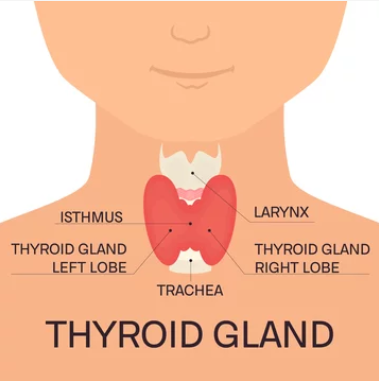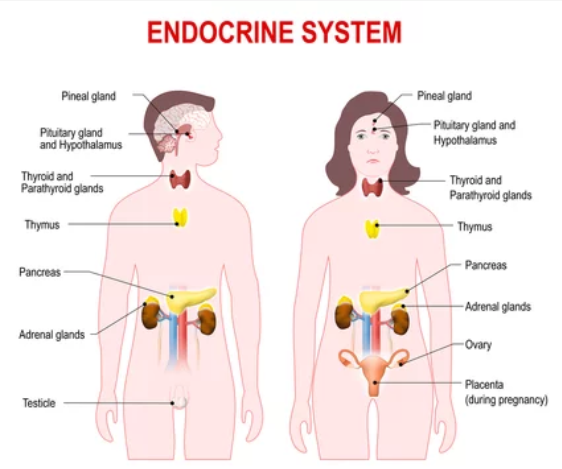What Is an Endocrinologist? All You Need to Know About Hormones and Health
Endocrinology is the study of hormones and the endocrine system. This study includes glands such as the thyroid, pancreas, pituitary and adrenal glands.
Hormones are chemicals these glands produce that regulate various bodily functions, like growth and development, metabolism, sexual function and mood.
Endocrinology is vital because hormones are crucial in maintaining good health and well-being. Hormone imbalances can lead to various health problems. These include diabetes, obesity, thyroid disorders, adrenal gland disorders, infertility, and hormonal cancers.
What Is the Endocrine System?
The endocrine system is a network of glands and organs that create and secrete hormones into the bloodstream. They act as chemical messengers, regulating various bodily functions and maintaining homeostasis or a balance within the body.
Photo credit: Adobe Stock
Glands Involved in the Endocrine System
Some of the essential glands in the endocrine system include the thyroid gland, pituitary gland, adrenal glands, pancreas, ovaries, and testes.
You may also like: How to Lose Weight
Hormones Produced by the Endocrine System
Each gland produces and secretes different hormones that have specific functions. Adrenal glands produce hormones that regulate stress and blood pressure, while the thyroid gland produces hormones that regulate metabolism.
Others include insulin, glucagon, estrogen, progesterone, testosterone, melatonin follicle-stimulating hormone (FSH), Luteinizing hormone (LH), oxytocin, and antidiuretic hormone (ADH).
Each hormone is crucial and has different functions in the body, including the following:
- Regulating metabolism and energy balance
- Controlling growth and development
- Maintaining fluid and electrolyte balance
- Regulating reproductive functions
- Controlling stress response
- Regulating blood sugar levels
- Regulating high levels of calcium in the blood
- Regulating the sleep-wake cycle
- Controlling appetite and satiety
- Regulating high blood pressure and heart rate
The endocrine system also coordinates with the nervous system to maintain bodily functions. Together, these systems ensure that the body works harmoniously to maintain overall health and well-being.
You may also like: What Is Saw Palmetto
Common Endocrine Disorders
Endocrine disorders can affect the functioning of the endocrine system. These disorders can significantly impact health and well-being. Early diagnosis and treatment are critical for managing symptoms and preventing complications.
Here are a few disorders that manifest from an unhealthy endocrine system:
Diabetes
Diabetes is a common endocrine disorder in which the body cannot properly process glucose, resulting in high blood sugar levels. Type 1 diabetes is caused by the immune system attacking and killing insulin cells in the pancreas. Type 2 diabetes happens when the body is unable to use insulin properly.
Thyroid Disorders
Thyroid diseases are another common endocrine disorder that affects the thyroid gland. Hypothyroidism occurs due to the under-activity of the thyroid gland. Symptoms of hypothyroidism include fatigue, depression, and weight gain.
On the other hand, hyperthyroidism occurs with an overactive thyroid gland. Symptoms include weight loss, anxiety, and heart palpitations. Grave’s disease is an autoimmune disorder that commonly causes an overactive thyroid.

Photo credit: Adobe Stock
Growth Hormone Disorders
Growth hormone disorders are a group of endocrine disorders that affect growth and development. One example is pituitary dwarfism. The body does not produce enough growth hormone, leading to stunted growth and development.
Adrenal Insufficiency
The adrenal gland secretes too little hormone aldosterone or cortisol. Symptoms include stomach upset, fatigue, and dehydration. Addison’s disease is an example of this. Other notable endocrine disorders include adrenocortical carcinoma and thyroid cancer.
Causes, Symptoms, Diagnosis, and Treatment for Each Disorder
Each endocrine disorder’s causes, symptoms, diagnosis, and treatment depend on the condition. These disorders are generally caused by a hormonal imbalance or dysfunction in one of the endocrine glands.
Symptoms may include changes in weight, mood, energy levels, or bodily functions such as menstruation or sex hormones. Diagnosis often involves blood tests and other imaging or diagnostic tests to measure hormone levels.
Treatment may include medication, lifestyle changes, or surgery, depending on the severity and underlying cause of the disorder.
Risk Factors and Prevention Strategies for Endocrine Disorders
Risk factors for endocrine disorders may include genetics, lifestyle factors such as diet and exercise, and exposure to certain environmental toxins. Prevention strategies include:
- Maintaining a healthy lifestyle
- Managing stress
- Avoiding exposure to environmental toxins
- Seeking regular medical care to monitor hormone levels and overall health
The Impact of Endocrine Disorders on Mental Health
Endocrine disorders can significantly impact mental health, as hormones are crucial in regulating mood and emotions. Some diseases can even be life-threatening.
Health experts have associated diabetes and thyroid nodules with a higher chance of depression, anxiety, and other mental health conditions.
The Role of an Endocrinologist
An endocrinologist provides specialized care to patients with hormonal and glandular disorders for overall well-being. You should see an endocrinologist if you notice the following symptoms:
- Unexplained weight gain or loss
- Fatigue
- Mood changes
- Changes in appetite
- Thirst
Endocrinologists can help diagnose and treat various conditions, including diabetes, thyroid, and growth hormone disorders.
What to Expect During a Visit to an Endocrinologist
You can expect to undergo a thorough evaluation of your medical history, symptoms, and any relevant lab or imaging tests. The endocrinologist will likely ask you questions about your lifestyle, diet, exercise habits, and any medications you currently take.
They might also perform a physical exam to check for signs of endocrine disorders. Based on their evaluation, the endocrinologist will develop a personalized treatment plan that may include medication, lifestyle changes, or other interventions.
Tests and Treatments Recommended by an Endocrinologist
Endocrinologists may recommend various tests to help diagnose and monitor endocrine disorders. These may include blood tests to measure hormone levels, ultrasound or MRI tests, or specialized tests such as glucose tolerance tests.
Treatment options for endocrine disorders can vary widely depending on the specific condition. Still, they may include medications such as insulin or thyroid hormone replacement. They’ll also advise lifestyle changes such as diet, exercise, or surgery.
Technology in Endocrinology
Technology has significantly impacted endocrinology, developing new diagnostic tools and treatments. For example, continuous glucose monitoring devices have made it easier for patients with diabetes to monitor their blood sugar levels.
At the same time, advances in hormone replacement therapy have improved outcomes for patients with thyroid disorders.
Photo credit: Adobe Stock
Related Articles
California Bills Mental Disorders Among Kids
Bank of Canada Official: Crypto Regulation Efforts Need to Keep Up With Market Growth
Lifestyle Changes for Endocrine Health
Positive lifestyle changes in certain key areas can help maintain optimal endocrine health and improve overall well-being. Here are a few lifestyle changes you can proactively make:
Exercise
Regular exercise can improve insulin sensitivity, reduce the risk of diabetes, and maintain a healthy weight. Exercise can also reduce stress levels, positively impacting hormone levels.
Diet
Eating a balanced diet of fruits, grains, and lean protein can help maintain healthy hormone levels. For example, foods high in fiber can regulate blood sugar levels and prevent insulin resistance.
Stress Management
Chronic stress can disrupt hormone balance in the body, resulting in a wide range of health problems. Yoga and meditation can reduce stress levels and improve overall endocrine health.
Sleep
Getting enough quality sleep is vital for maintaining healthy hormone levels. Sleep deprivation can disrupt the balance of cortisol, insulin, and growth hormone hormones. Try to get 7–8 hours of sleep per night and establish a regular sleep schedule.
Conclusion
Understanding endocrinology is crucial for comprehending the complex workings of the human body. The endocrine system maintains homeostasis and regulates numerous bodily functions.
Understanding endocrinology and how it affects one’s health is essential for healthcare professionals and anyone interested in living a healthy lifestyle.



